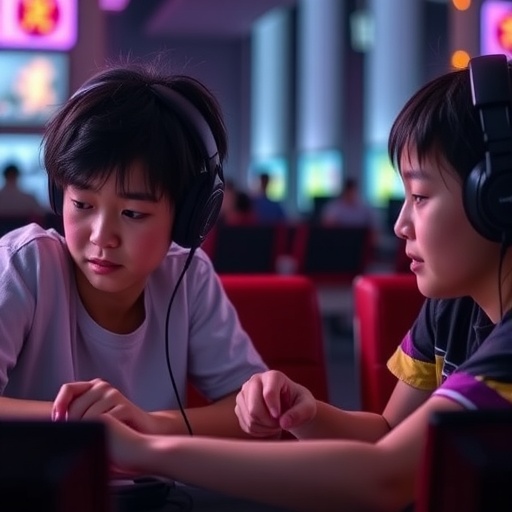A recent comprehensive survey conducted among school-aged children and adolescents in Hong Kong has unveiled critical insights into the multifaceted impacts of binge gaming, exposing its significant associations with mental health challenges, social functioning, and academic performance. This large-scale epidemiological investigation, encompassing a sample of 2,592 participants, employed rigorous psychometric assessments to elucidate the complex relationships between excessive video gaming patterns, particularly binge gaming, and adverse psychological and behavioral outcomes.
Binge gaming, defined by extended uninterrupted gaming sessions often spanning several hours, has emerged as a behavior of growing concern worldwide. Unlike casual or moderate gaming, binge gaming involves intensive and disproportionate engagement with digital games, which can precipitate a cascade of neuropsychological alterations. The current study meticulously dissected the prevalence of binge gaming across genders, revealing a notably higher incidence among boys compared to girls, a disparity that mirrors previous global trends yet invites further inquiry into gender-specific vulnerabilities and sociocultural drivers.
Among the most striking findings of this survey is the robust correlation between binge gaming and a spectrum of mental health disorders, including clinically significant levels of depression and anxiety. Utilizing standardized diagnostic scales, researchers quantified these associations, highlighting that children and adolescents engaging in binge gaming were disproportionately likely to report symptoms consistent with mood disturbances. The pathophysiological underpinnings of this relationship suggest that excessive gaming may disrupt neural circuits involved in emotional regulation and stress response, potentially exacerbating or even precipitating psychopathology.
Another pivotal dimension illuminated by this research pertains to the deleterious effects of binge gaming on sleep quality. Sleep disturbances, a critical factor in cognitive and emotional health, were reported with notable frequency among binge gamers. The mechanistic explanations for impaired sleep include dysregulated circadian rhythms due to prolonged screen exposure, heightened cognitive and emotional arousal from gaming content, and behavioral displacement of sleep time. The resultant sleep deficits subsequently compound the risk for mood disorders and impair daytime functioning, generating a vicious cycle that perpetuates gaming addiction and psychological distress.
Academically, the impact of binge gaming was equally profound. The study documented a consistent pattern of poorer academic outcomes among youth with excessive gaming behaviors. This encompasses diminished concentration, lowered classroom engagement, and suboptimal performance on standardized academic assessments. The cognitive load imposed by extended gaming sessions may interfere with executive functioning, working memory, and attentional control, which are indispensable for effective learning. Furthermore, the time investment in gaming likely competes with study time, exacerbating educational setbacks.
Socially, binge gaming exhibited ambivalent consequences. While gaming communities can foster social interaction and peer bonding, binge gaming in excess was correlated with social withdrawal and reduced participation in extracurricular activities. This paradox underscores the complex nature of digital engagement, where virtual socialization may replace offline interpersonal connections, potentially impairing social skills development and emotional intimacy.
The gender disparities observed in this research further nuance our understanding. Boys exhibited a higher propensity to engage in binge gaming, reinforcing prior data suggesting gendered differences in gaming preferences and susceptibilities. These differences may stem from sociocultural norms, peer influences, and gender-specific neurobiological vulnerabilities. Recognizing these distinctions is critical for tailoring preventative interventions and therapeutic strategies.
Notably, the large, representative sample size and the application of validated measurement tools in this study bolster the reliability and generalizability of its findings. The researchers employed cross-sectional survey methodologies coupled with standardized inventories for assessing mental health symptoms, gaming behavior patterns, and academic and social functioning, allowing for a comprehensive multivariate analysis that adjusted for potential confounders.
The implications of these findings resonate beyond clinical psychology and education, beckoning multi-sectoral collaboration to address burgeoning public health concerns linked to digital media consumption. Policy frameworks must incorporate evidence-based guidelines for healthy gaming habits, parental monitoring, and early identification of at-risk youth.
Moreover, the neuroscientific community is called upon to delve deeper into the mechanistic pathways by which binge gaming influences brain development and function. Longitudinal neuroimaging studies may elucidate the temporal sequence and causal links between excessive gaming, neurocognitive alterations, and mental health disorders, offering targets for intervention.
In educational settings, integrating awareness programs about the risks of binge gaming could mitigate its negative outcomes, fostering healthier digital habits among students. Schools might consider screening for gaming behavior as part of routine psychosocial evaluations, ensuring timely support.
This study’s findings also accentuate the importance of precise operational definitions in behavioral research. The distinction between “binge gaming” and general gaming clarifies behavioral phenotypes and their differential impacts, guiding both research and clinical practice.
In summary, this seminal school-based survey from Hong Kong presents compelling evidence that binge gaming transcends a mere recreational activity, exerting pervasive effects on mental health, sleep, academic achievement, and social functioning, with pronounced gender disparities. It underscores the urgent need for integrative strategies encompassing research, policy, education, and clinical practice to mitigate the adverse consequences of this modern behavioral phenomenon.
Subject of Research: Binge gaming and its associations with mental health, academic performance, sleep quality, and social outcomes among children and adolescents in Hong Kong.
Article Title: The roles of binge gaming in social, academic and mental health outcomes and gender differences: A school-based survey in Hong Kong
News Publication Date: 13-Aug-2025
Web References: http://dx.doi.org/10.1371/journal.pone.0327365
Image Credits: lalesh aldarwish, Pexels, CC0
Keywords: binge gaming, depression, anxiety, sleep disturbances, academic performance, social outcomes, children, adolescents, gender differences, mental health, digital addiction




